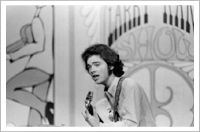By Don Jacobson
Roky Erickson turned 60 this month, and, really, that’s something of a miracle right there. Not only did he manage to survive the acid-drenched late ’60s San Francisco psychedelic rock scene, where he was considered something of a magic child in a culture where such prodigies were frequently worshipped to death, but also the long, lonely years that followed in which he coped as best he could with the ravages of mental illness under the misinformed and smothering guardianship of his wacky mother back home in Austin, Texas. That he is now seemingly fully recovered from his “schizophrenia” (a disputed diagnosis) – free even of anti-psychotic drugs – and has made a triumphant return to the rock ‘n’ roll stage is a story that has few equals even in the excess-stained annals of music lore.
 The Roky saga has been wonderfully captured in a 2005 documentary released this month on DVD called You’re Gonna Miss Me, created over a five-year period by Keven McAlester, a former alternative weekly freelance writer turned filmmaker. He’s done a great job in bringing the tragedy and humor of Roky’s amazingly strange life to a broad audience that is quickly rediscovering the thrillingly direct-and-intact link to the very beginnings of rock’s modern era he represents. It’s almost like those Zanzibar fishermen pulling a live coelacanth out of the deep – he’s like a living fossil going back to an ancient era from which pretty much all the most brilliant participants are either dead, living casualties or long since retired.
The Roky saga has been wonderfully captured in a 2005 documentary released this month on DVD called You’re Gonna Miss Me, created over a five-year period by Keven McAlester, a former alternative weekly freelance writer turned filmmaker. He’s done a great job in bringing the tragedy and humor of Roky’s amazingly strange life to a broad audience that is quickly rediscovering the thrillingly direct-and-intact link to the very beginnings of rock’s modern era he represents. It’s almost like those Zanzibar fishermen pulling a live coelacanth out of the deep – he’s like a living fossil going back to an ancient era from which pretty much all the most brilliant participants are either dead, living casualties or long since retired.
Roky, maybe because of the many years he spent in quiet seclusion obsessively collecting junk mail and blasting white noise from his TVs and radios to drown out the voices in his head, has somehow preserved his utterly unique singing voice. Now back on stage at such places as the Coachella Festival, he can trot it out as if nothing had ever happened since 1967.
It’s scary, weird and wonderful all at once.
The movie doesn’t dive too deeply into how Roky and his group, the 13th Floor Elevators, became a highly influential “band’s band” in San Francisco, and instead mostly sticks to his even-more-fascinating personal story. It begins in 1999 when Roky was at his lowest ebb. The cameras capture a poverty-stricken, Texas white-trash lifestyle both at his junk-filled apartment and his mother Evelyn’s place, where she spends her time making cardboard-and-newsprint art collages depicting her own relationships with Roky and her other four sons, including her youngest, Sumner Erickson, who has become a tuba player with the Pittsburgh Symphony Orchestra. You get the impression that Evelyn called the shots in her family, and that the boys’ father was pretty much out of the picture. She doesn’t seem so much loony as depressed, lonely and manipulative.
Roky, meanwhile, is fat, out of touch, his teeth rotten, his hair totally unkempt, spending long hours puttering about his trash house carefully collecting and recording into notebooks the types and addresses of all the junk mail he can find. An unmistakable picture of mental illness.
The crux of the story is the guardianship struggle that develops between Evelyn and Sumner, a man who, in his 30’s, experienced his own emotional catharsis through therapy and decided he needed to rescue Roky from his mother’s clutches. On his side was Roky’s own son, who has been denied access to his father by Evelyn, as well as several of the brothers. They object to Evelyn’s strict policy of not letting Roky use any kinds of modern anti-psychotic drugs – she “doesn’t believe in drugs” and blames LSD for destroying Roky. Sumner claims in court that it’s not just the lack of access to possibly helpful drugs, but also general neglect that Evelyn’s guilty of – Roky’s untreated abscessed teeth are posing a health threat to him, as is his trashed-out subsidized apartment.
In the context of the court case, the past is examined and dredged up. His then-current course was set in 1968. That’s when he fled home to Austin when the San Francisco acid scene became too much for him to handle. It was Tommy Hall, the band’s “electric jug” player, who was an LSD guru and strong devotee of Timothy Leary’s belief in the drug’s ability to swing wide the doors of creative consciousness. Hall is credited with coining the term “psychedelic rock.” He pushed singer Roky and the other then-band members, guitarist Stacy Sutherland and drummer John Ike Walton, to take as much acid as possible. Roky, however, was someone who was already “not of this earth” and was “permanently tripping” on his own, according to Austin poster artist Jim Franklin. So when Roky and LSD met, there were bad consequences. As Walton tells the story:
“Roky’s second acid trip hurt him. Hurt me, too. I think Tommy gave us too much. I had a real bad trip and so did he. But he kept on taking the acid, thinking everything would get better. I quit. I didn’t want another one of those experiences. The walls dissolving . . . I fell off my drum stool. We were playing along, jamming, playing ‘Before You Accuse Me,’ when all of a sudden, wham, this just hit me. I fell backwards, fell off my drum stool, almost broke my neck. I was crawling around on the floor, I crawled outside and they came and got me and brought me back inside the house. I was scared. But Stacy, Tommy and Roky were not scared.”
Roky at one point testified he had done acid 300 times. Now famous and back home, he suffered a psychotic episode at his mother’s house where he ran around convulsively spouting gibberish. The Austin cops also decided to target and make an example of him – the beginning of his political victimhood. In 1968 he was busted with one joint, and ended up being committed to the Texas mental health system in an effort to avoid jail. He unwillingly underwent electroshock treatments, and spent four years at the notorious Rusk maximum security hospital. He joined a band in there that included several multiple murderers.
 Given those depths, his comeback was long and torturous indeed. Maybe it’s a testament to the childlike innocence that clung to him despite all the craziness, but the Roky that we see at the end of film, the one with his musical abilities amazingly intact and ready for a late-life close-up, is nothing short of awe-inspiring.
Given those depths, his comeback was long and torturous indeed. Maybe it’s a testament to the childlike innocence that clung to him despite all the craziness, but the Roky that we see at the end of film, the one with his musical abilities amazingly intact and ready for a late-life close-up, is nothing short of awe-inspiring.
As for his musical legacy, which is truly wide-ranging, it’s probably best summed up in the movie by ZZ Top’s Billy Gibbons, who credits much of his guitar style to the influence of the 13th Floor Elevators and claims them as the key link between West Coast rock’s folkie and garage elements:
“Roky Erickson to this day is one of the out-and-out wildest rock singers. The talent behind Roky’s voice is the mystery factor that no one could touch. To this day, he stands alone and is revered as such an unusual artist, because he had the gift of that wonderful voice.
“There’s no question about the impact that the Elevators would have throughout the American music scene. The bands of the Bay Area were drawing upon a more folk-based kind of thing, and when the Elevators showed up, things changed real quick.”
*
In honor of the DVD’s release, the Sound Opinions crew of Greg Kot and Jim DeRogatis are holding a special screening of “You’re Gonna Miss Me” on Tuesday at the Music Box Theater. On hand will be director McAlester, who will be available for audience questions after the showing.
*
Toss a message down the steps into Don’s Root Cellar by clicking here.
*
Catch up with with the Root Cellar archive.
Posted on July 23, 2007


